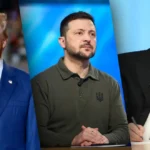The Munich Security Conference has always been an important event for discussing global politics and security. However, this year, interest in it has particularly grown. The main reason for such excitement is the change in the US approach to global security. Washington is increasingly focused on internal issues and seeks to shift responsibility for stability in Eurasia to European partners. This forces the EU and NATO to play a more active role in resolving international conflicts and increase defense spending.
Conference Participants: Who Will Discuss World Security?
This year, the event will be attended by approximately 60 heads of state and government, as well as 150 ministers and heads of international organizations. Among the most influential figures expected are:
- President of the European Commission Ursula von der Leyen
- President of the European Parliament Roberta Metsola
- President of the European Council António Costa
- High Representative of the EU for Foreign Affairs and Security Policy Josep Borrell
- NATO Secretary-General Jens Stoltenberg
- UN representatives
Among the German participants of the conference will be Defense Minister Boris Pistorius, as well as all candidates for the chancellorship – incumbent Chancellor Olaf Scholz, Friedrich Merz, Robert Habeck, and Christian Lindner.
Who Did Not Receive an Invitation?
This year, the organizers decided not to invite representatives of extreme political forces. The list does not include members of the far-right party “Alternative for Germany” (AfD) and the Left Party of Sahra Wagenknecht. As explained by conference chairman Christoph Heusgen, these parties do not adhere to the main principle of the event – “peace through dialogue.” In addition, German intelligence services classify certain branches of AfD as potentially dangerous and extremist.
What to Expect from the Conference?
The event will take place from February 14 to 16, just a week before the federal elections in Germany. The main topics of the conference:
- Strengthening European defense amidst reduced American support
- The war in Ukraine and its impact on European security
- Relations between the EU, US, China, and Russia
- NATO enlargement and its strategic priorities
It is expected that among the main speakers will be the President of Ukraine, Volodymyr Zelensky. His participation has not been officially confirmed yet, but the organizers believe he will address the future of Ukraine and international support.
Why is the Munich conference so important?
Since 1963, the Munich Security Conference has been one of the world’s most influential forums where key international security issues are discussed. This is where decisions are made that shape the future geopolitical agenda. In 2025, the main intrigue is whether Europe can take more responsibility for its security and whether it will be left alone facing global challenges if the role of the US in world politics weakens.
